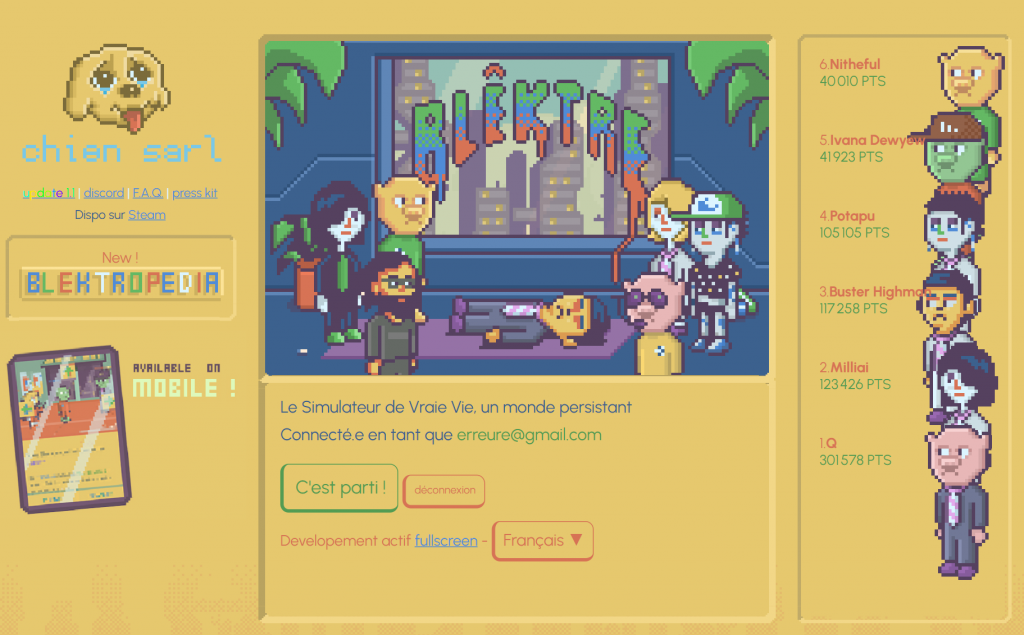
I know that only developers enjoy reading other developers’ devblogs, and that it doesn’t help in any way to attract players’ attention to the game.
However, I’m discovering the immense challenge that is the marketing side of solo game development — one can be an artist, a developer, and a musician all at once, but rarely is one prepared to face the harsh reality of numbers and the market. So, to remind myself that making a game isn’t just about marketing, I feel the need to share the inner workings of the technical and creative effort it requires. It contributes to my motivation, my mental health, and it might even, who knows, genuinely interest other developers.
This first post will retrace the entire genesis of the project, but afterward, this blog will serve as a devlog.
Introduction to the first Blêktre
Blêktre 2081 is actually a follow-up to a web game I made 15 years ago.
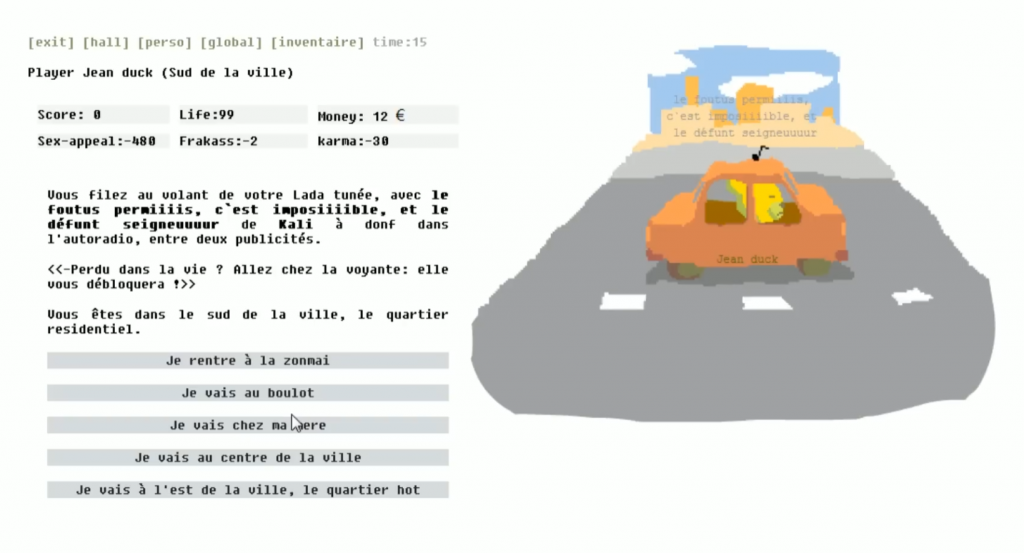
I was a 25-year-old junior PHP developer, self-taught and working as a webmaster in a T-shirt printing company (I was allergic to classrooms, and at my request, my boss had written me an exemption from the classes required by my work-study contract). I was already making a number of quirky websites with my partner-in-crime BobArdkor, when I decided to start programming my first video game with the tools I had at hand — that is: PHP, a language not at all suited for real-time interactions, and therefore, seemingly ill-suited for video games. However, creating a text-based game, like a choose-your-own-adventure book, was within reach. And that was perfect, because I loved that kind of role-playing game.

Graphically pixelated
I was a somewhat known comic blogger under the name Charles Saucisse (Charles Sausage, in english), and I was able to bring my paper characters to the screen thanks to Flash, a now-defunct software (at the time, it didn’t even belong to Adobe yet, but to Macromedia).
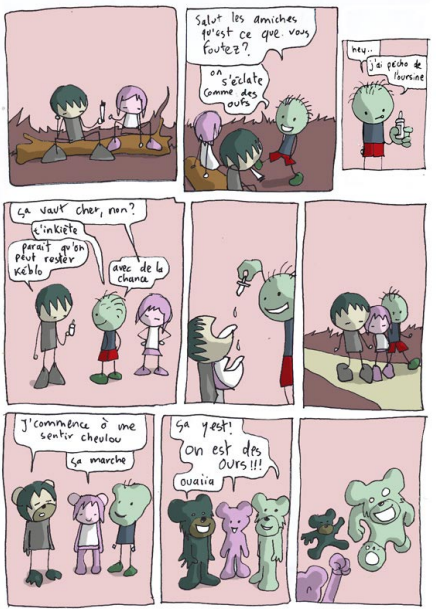
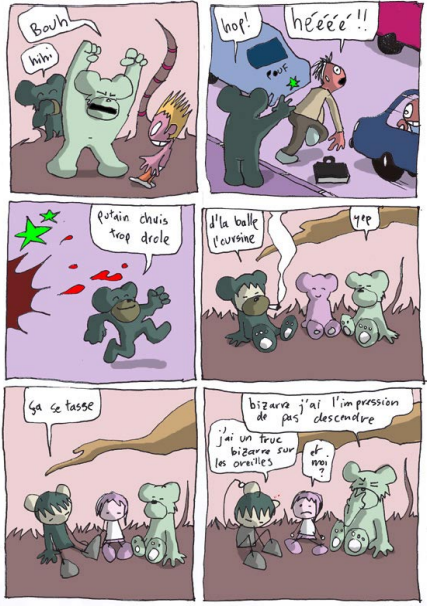
Visually, I had also drawn inspiration from the old video games of my childhood, especially Rampage — you might notice a vague resemblance in their pixelated faces. In 2005, I suppose we were approaching the era where the kids who had grown up with those huge pixels were finally becoming able to develop their own games, and the pixel art revival was about to begin.
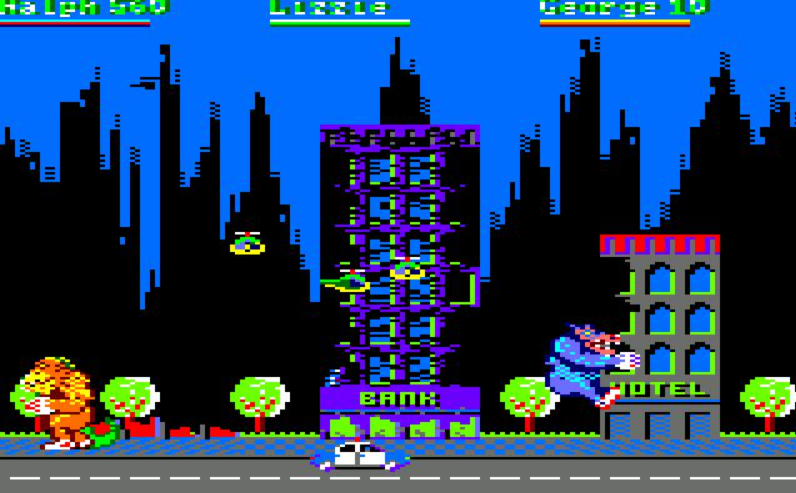
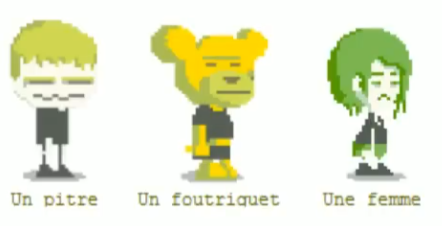
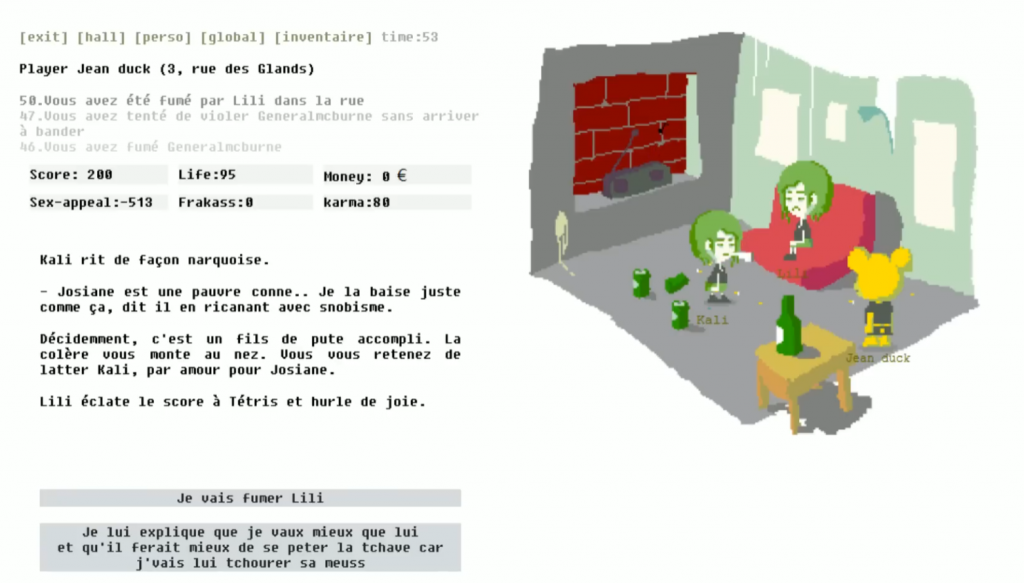
Gameplay: the rotating seat system
Beyond the interactive storytelling and its deliberately vulgar and disturbing tone, the main feature of Blêktre was its role system, or “rotating seats,” which was tied to the asynchronous nature of the multiplayer, itself born out of the limitations of using PHP.
To avoid interrupting a player in the middle of a narrative moment, interactions happened with a delay, through a notification system I called “interruptions.” Once your mini “chapter” was completed, you might learn that another player had taken you out and stolen your position as manager at your workplace.
The city of Blêktre was made up of different roles: your mother, your boss, the police officer, the cashier, your neighbor, the club DJ… All of these were positions players could fight over using a vaguely RPG-like system made up of three stats: karma (for physical actions), sex-appeal (for charm-based actions), and “frakass” (french slang for “stoned,” representing your mental health state).
It was pretty simplistic, but original and funny, since it encouraged player interaction.
In terms of gameplay, it was quite clunky: once the puzzles were solved in point-and-click adventure style, you had to endlessly repeat the same actions to grind money, karma, or other stats. Only the over-the-top humor and vulgarity made the imbalance bearable, creating a world where “losing was fun,” and humiliation was everywhere.
Technically questionable
I had my first hackers pretty early on, who quickly broke the game, because it has to be said: I was writing truly awful code at the time.
After running into issues, a few programmer friends took a look at the code and said it made their eyes bleed. Out of pity, BobArdkor refactored it to include some basic classes and functions, saving me from the monstrous pile of ifs and elses. Others wrecked my SQL database just to show me how to defend against injection attacks, and so on. But in the end, the game kept running and held up for years.
Unexpected reception
When my friends and acquaintances started testing the game, they quickly became addicted. The messed-up humor and multiplayer aspect worked really well: people could fight, have kids together, steal each other’s jobs, humiliate one another, and compete for the high score. The game was free, and I think it offered a shocking and unique experience.
Thanks in part to the blog comic, which had a small following, 5,000 player accounts were created during the first three years.
The game was french localized, and there I has been reviewed and interviewed. There’s only one late let’s play still on Youtube.
But the funniest part was the video game being adapted for the stage by a French novelist named Nathalie Quintane, who liked the universe (hopeless, jobless people) and its textual tone. It was then directed by a well-known theater director, Yves-Noël Genod. The result was deeply unexpected for me, especially since I was completely unaware of the contemporary art scene at the time. Did it help promote the game? I can’t tell, but it definitely made my parents proud.
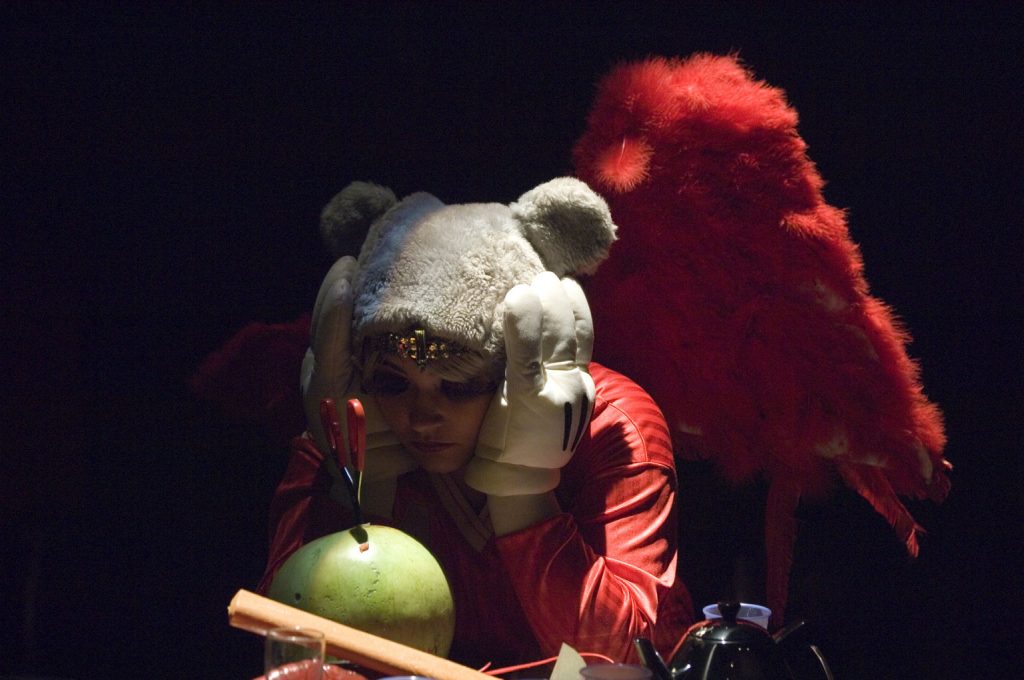
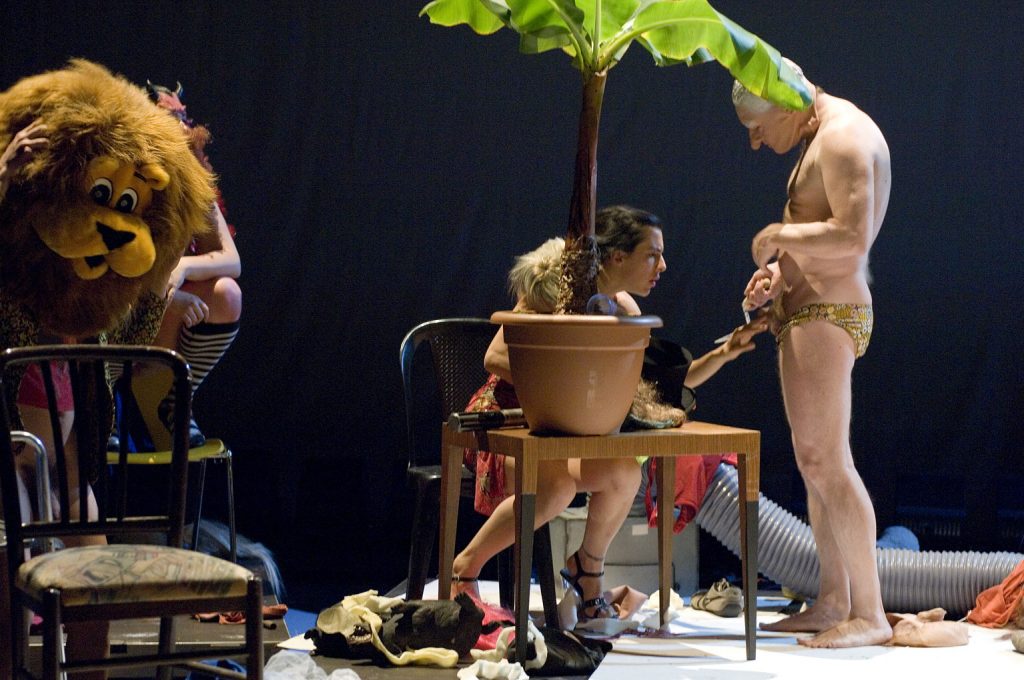
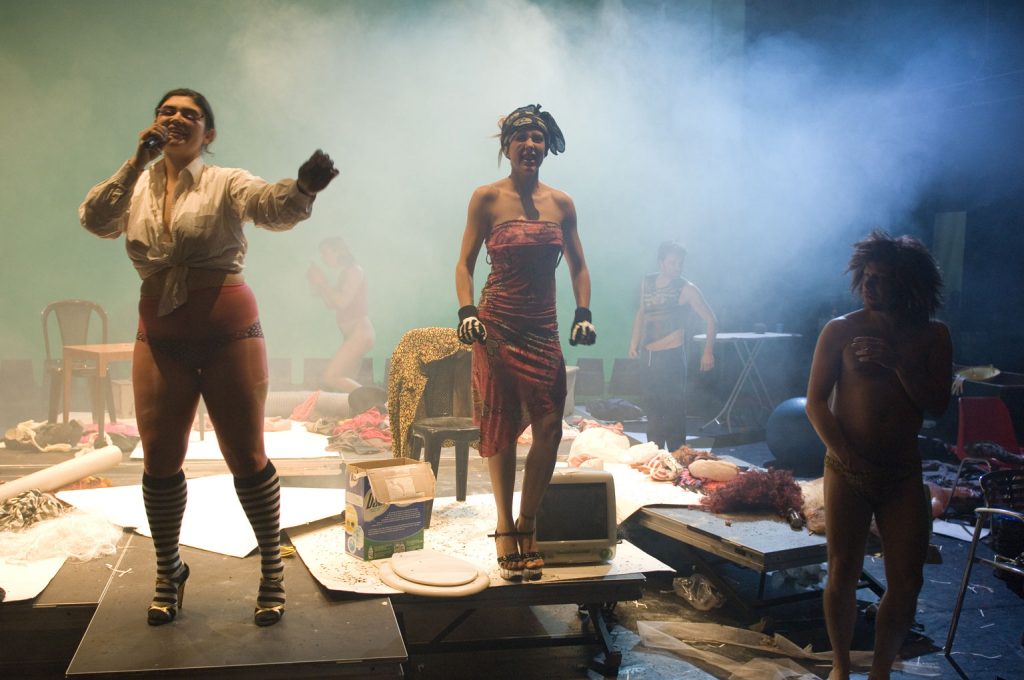
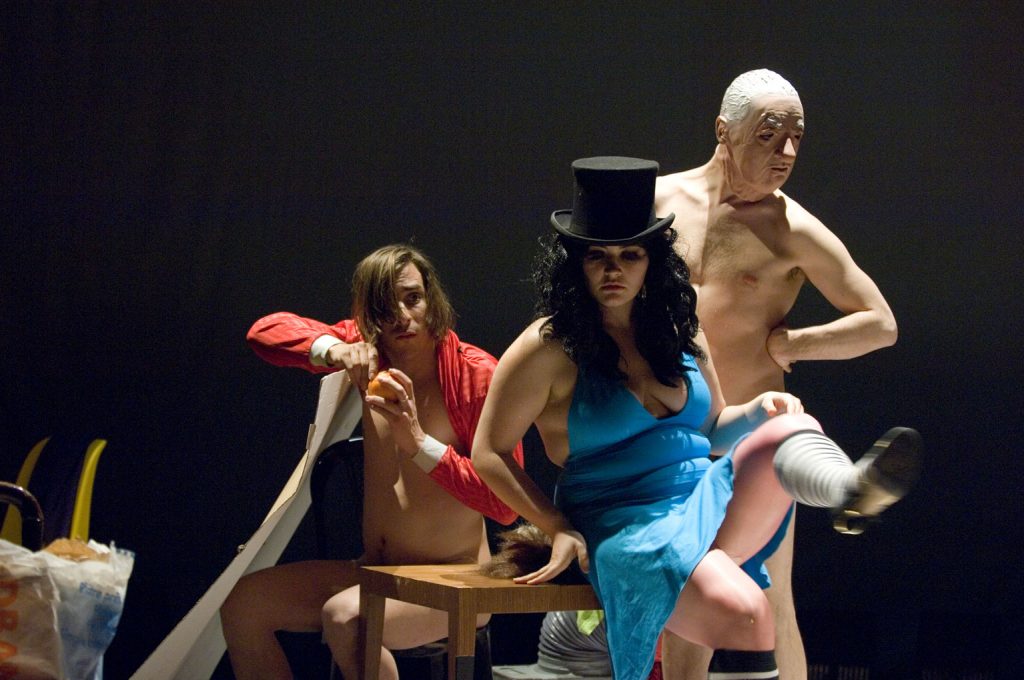
See the video trailer of the piece here (contains nudity) https://vimeo.com/4197425
Also : this streamer’s video might be the only existing footage of Blêktre today (French) : https://www.youtube.com/watch?v=zjIKlsg9x1o
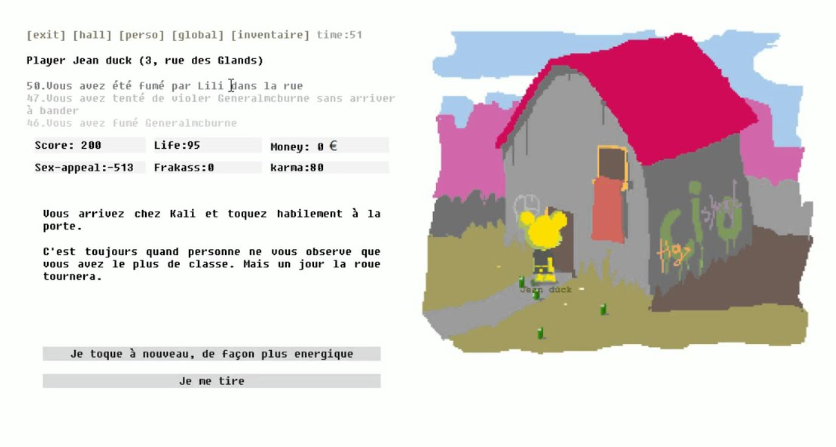
The death of Blêktre 1
The game held on for a couple of years, but eventually Flash stopped being supported by browsers, breaking the visuals even though it was still technically playable. I kept the server running for a while, but a crash during a hosting migration ultimately killed the application for good.
However, the main reason I didn’t bring it back was because the humor had become blatantly outdated. What once seemed subversive and amusingly offensive at the time became a real problem by the 2010s, as systemic misogyny was being publicly recognized. As a young white male unconsciously reproducing patriarchal patterns, I realized Blêktre was deeply flawed—it allowed players to rape each other on nearly every street corner. It was time to acknowledge it as an immature early work and put it away in the box of memories.
In the next post, I’ll write about the various prototypes that gradually led me to Blêktre 2081. To be continued !